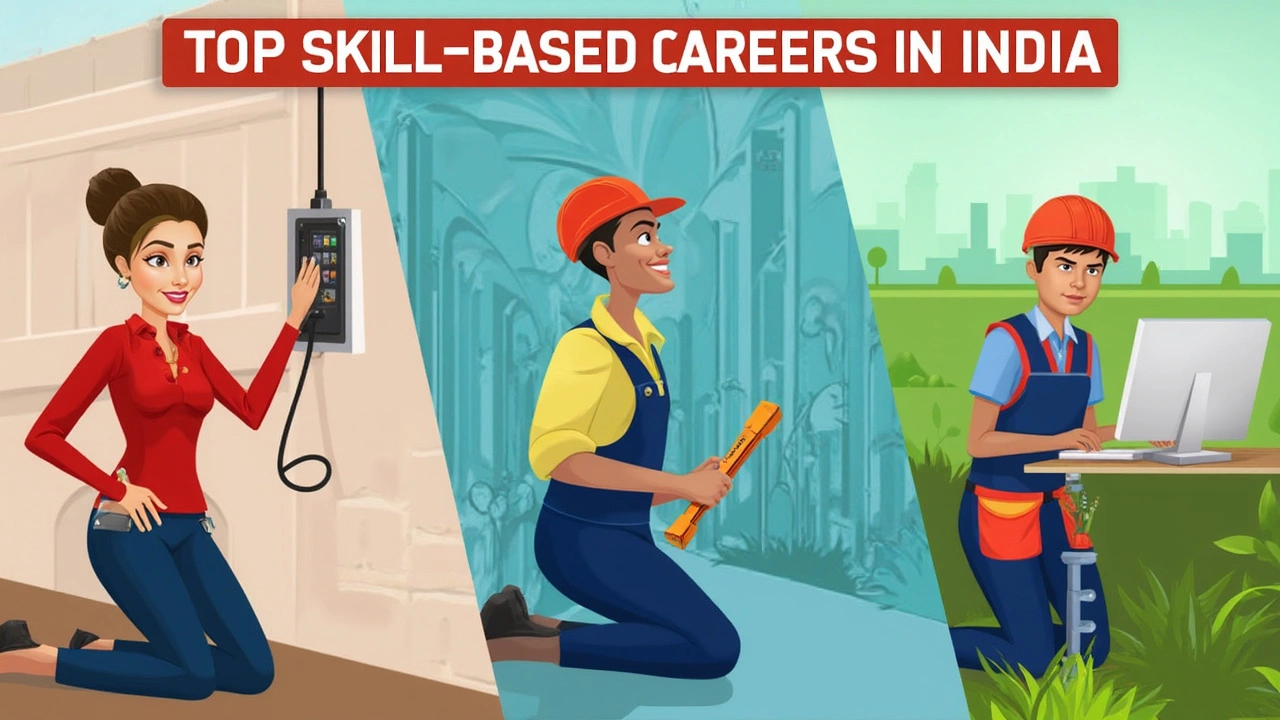
Four-year college degrees get all the attention, but skills training is where the real action’s at right now in India. Fact: the country faces a massive gap between what companies want and what most grads can actually do. That’s why trade courses—think electricians, fitters, welders, plumbers, and computer hardware techs—are suddenly the hot ticket.
A lot of people are surprised to hear that skilled trades can mean faster job offers and more reliable paychecks. Companies in manufacturing, IT support, plumbing, and construction are desperate to hire folks with hands-on skills instead of fancy titles. Everyone wants a job that’ll stand the test of time and not be replaced as soon as the next app drops, right?
So, what trade should you actually pick? That’s where things get tricky. It’s not just about pay, but also job security, demand, and the kind of work you want to do every day. Training is more affordable than most college courses, and you can start working much sooner. That means less debt and more real-world experience while your college friends are still stuck in classes.
- Why Trade Courses Matter More Than Ever
- Honest Look at India's Top Trades
- Skills You Need and Where to Learn Them
- Smart Tips to Pick Your Perfect Trade
Why Trade Courses Matter More Than Ever
India’s job scene is changing fast, and there’s a huge gap between what employers need and what job seekers have. Skipping college isn’t the taboo it once was, especially when you realize how fast you can start earning with a skill. As of 2023, only about 27% of Indian college graduates were actually “employable” according to a big survey by Wheebox. That means most degree holders don’t have the right hands-on skills for the jobs out there.
Trade courses step in here—teaching exactly the practical stuff that companies are looking for. You learn by doing, not by memorizing thick books. Want some proof? Here’s a quick look at why these courses are getting a second look:
- trade courses India are usually shorter and cheaper than college degrees.
- Almost every industry—automobile, construction, electrical, healthcare, IT—needs trained workers, and there never seem to be enough of them.
- On average, people finishing a trade course find a job in their field within 6 months.
- Entry-level salaries for some skilled trades now beat many starting salaries for fresh graduates.
Check out this table to see how different paths stack up:
| Type of Course | Typical Duration | Average Course Fee (INR) | Average Starting Salary (per year, INR) |
|---|---|---|---|
| ITI Electrician | 2 years | 15,000 - 30,000 | 1,80,000 - 2,50,000 |
| Polytechnic Diploma (Mechanical) | 3 years | 30,000 - 60,000 | 2,00,000 - 3,00,000 |
| BA/BSc Degree | 3 years | 50,000 - 2,00,000 | 1,50,000 - 2,40,000 |
It’s clear—if you’re focused on jobs, trade courses really stack up. Plus, they bring another big benefit: less student debt to worry about once you get started. The government and private sector both now offer skill programs, making it even easier to get started in trades.
Honest Look at India's Top Trades
When people talk about trade courses India, a few jobs always top the list—but some are way more practical in today’s market. Electricians, fitters, plumbers, welders, and computer hardware technicians consistently show up in job reports because there's real demand. For example, the National Skill Development Corporation (NSDC) says India will need an extra 1.7 million electricians and 900,000 plumbers by 2026. These numbers aren't made up—they reflect the push towards more infrastructure and housing projects around the country.
Let’s not forget about automotive technicians—car sales are rising, and electric vehicles are catching on, which means mechanics with modern training are becoming pretty much irreplaceable. Similarly, short courses for CNC machine operators and industrial fitters keep showing up as top picks in job placement stats—these skills are powering small factories and big industries alike.
"Vocational training has become the backbone for India’s growth in both rural and urban economies. Skilled trades are the bridge to meaningful employment for millions."
— Rajesh Aggarwal, former Secretary, Ministry of Skill Development & Entrepreneurship
Healthcare trades are booming too. Lab technicians, X-ray assistants, and pharmacy assistants are in short supply, especially outside big cities. These roles usually need a 1-2 year diploma and offer decent pay plus plenty of job security. As healthcare clinics pop up everywhere, demand is only going up.
For those with a tech bent, computer hardware and networking courses are worth a look. Big companies and small businesses still need people who can set up networks, fix computers, and solve tech headaches on the spot. These paths don’t just offer jobs; some folks go on to start their own small service firms.
What’s most striking is how many of these trades let you work anywhere in India, and even abroad. If you bring solid skills, you’re not limited to one city—or even one country. Think about where you want to live, what kind of hours suit you, and whether you’d rather be hands-on or behind a desk. That makes your trade decision personal, not just practical.

Skills You Need and Where to Learn Them
If you’re serious about jumping into a trade, the first thing you need is a clear idea of what skills are actually needed. Let’s be honest, just being “good with your hands” isn't enough now. Companies want practical skills, up-to-date know-how, and a bit of real-world smarts to match.
The hottest trades in India—like electrician, plumber, welder, automotive mechanic, and computer hardware technician—need technical abilities plus problem-solving and safety awareness. For example, a welder needs to read blueprints and understand arc welding, while an electrician must know local wiring rules and the basics of circuit troubleshooting. Even government job notifications mention these specifics when they hire through ITIs.
Before you sign up anywhere, check for certifications that matter. Recognized qualifications from the National Skill Development Corporation (NSDC), Industrial Training Institutes (ITIs), or sector-specific bodies add real value to your CV. Here’s a quick comparison of popular trades, the main skills you need, and where to start learning:
| Trade | Core Skills | Where to Learn |
|---|---|---|
| Electrician | Wiring, Circuit Analysis, Safety Checks | ITI, Polytechnics, NSDC-accredited courses |
| Welder | Arc Welding, Blueprint Reading, Metal Cutting | ITI, NSDC, Private trade schools |
| Plumber | Pipe Fitting, Water Systems, Leak Detection | ITI, State Gov’t skill centers, PPP model training |
| Automobile Mechanic | Engine Repair, Diagnostics, Electrical Systems | ITI, Auto manufacturer skills academies |
| Computer Hardware Technician | System Assembly, Troubleshooting, Networking Basics | Polytechnics, NSDC partners, Private tech institutes |
Wondering if these courses are accessible? Most states have government-run ITIs in nearly every district now, and NSDC-affiliated centers are popping up in major cities. Many programs are short—six months to two years—and often include internships. Private institutes sometimes offer fancier facilities, but always check if their certificate is recognised.
- trade courses India are loaded with hands-on work.
- Look for programs that promise at least 60% practical training and real-life industry exposure.
- Don’t just ask for the fees—ask about placement help too. ITIs and a bunch of private centers have strong links with companies.
Plenty of students from small towns have landed solid jobs through ITI or NSDC-backed programs. It’s not about where you start, but how you pick the course and make the most of what’s taught—if you stay sharp, you’ll never run out of work.
Smart Tips to Pick Your Perfect Trade
If you’re trying to figure out which trade fits you best, don’t just follow what your friends are doing or what your parents say is safe. Picking the right trade can change your whole career game, so it’s worth putting some thought into it.
- India's best trade isn’t the same for everyone. The best fit depends on your interests, what’s needed where you live, and how much you’re willing to learn. For example, a construction electrician might find huge demand in fast-growing cities, while a welder could earn more in industrial hubs.
- Research is your friend. Search for local and national hiring trends to see which trades are booming. Sites like National Skill Development Corporation (NSDC) and platforms like LinkedIn show real-time job openings. According to NSDC, areas like electrical work, plumbing, and automotive repair have reported over 30% job vacancy rates in the past two years because they can’t fill roles fast enough.
- Don’t ignore hands-on exposure. If you can, visit training centers, talk to people actually working in the field, or watch YouTube videos that show what a typical workday looks like. If possible, try short internships—sometimes one week on a shop floor teaches you more than hours of reading.
- Watch out for scams. A lot of “trade schools” overpromise and underdeliver. Always check if the course is recognized by government bodies like NCVT (National Council of Vocational Training) or SSC (Sector Skill Council). This ensures your certificate is valid when you go job hunting.
- Compare money vs. job security vs. job satisfaction. Don’t chase money alone—a high-paying job that drains you will leave you burnt out. It’s smarter to balance earning potential, future demand, and whether you can see yourself doing the job long term.
Here’s a quick rundown of how some top trades in India stack up—check the table below for the latest salary and job placement stats (2024 figures):
| Trade Course | Average Starting Salary (per month) | Placement Rate (%) | Training Duration |
|---|---|---|---|
| Electrician | ₹18,000 - ₹22,000 | 80% | 12-24 months |
| Fitter | ₹15,000 - ₹20,000 | 76% | 12-24 months |
| Plumber | ₹13,000 - ₹18,000 | 73% | 6-12 months |
| Automotive Mechanic | ₹16,000 - ₹23,000 | 78% | 12-24 months |
| Computer Hardware Technician | ₹17,000 - ₹25,000 | 81% | 12-18 months |
Lastly, use your networks. Join WhatsApp groups, LinkedIn forums, or local community meetups. People in those circles share job leads, training tips, and sometimes even warn you about dodgy academies. And remember, nobody gets it perfect on the first try; if you need to switch trades after a year or two, that’s fine—most skills are transferable anyway.
Write a comment